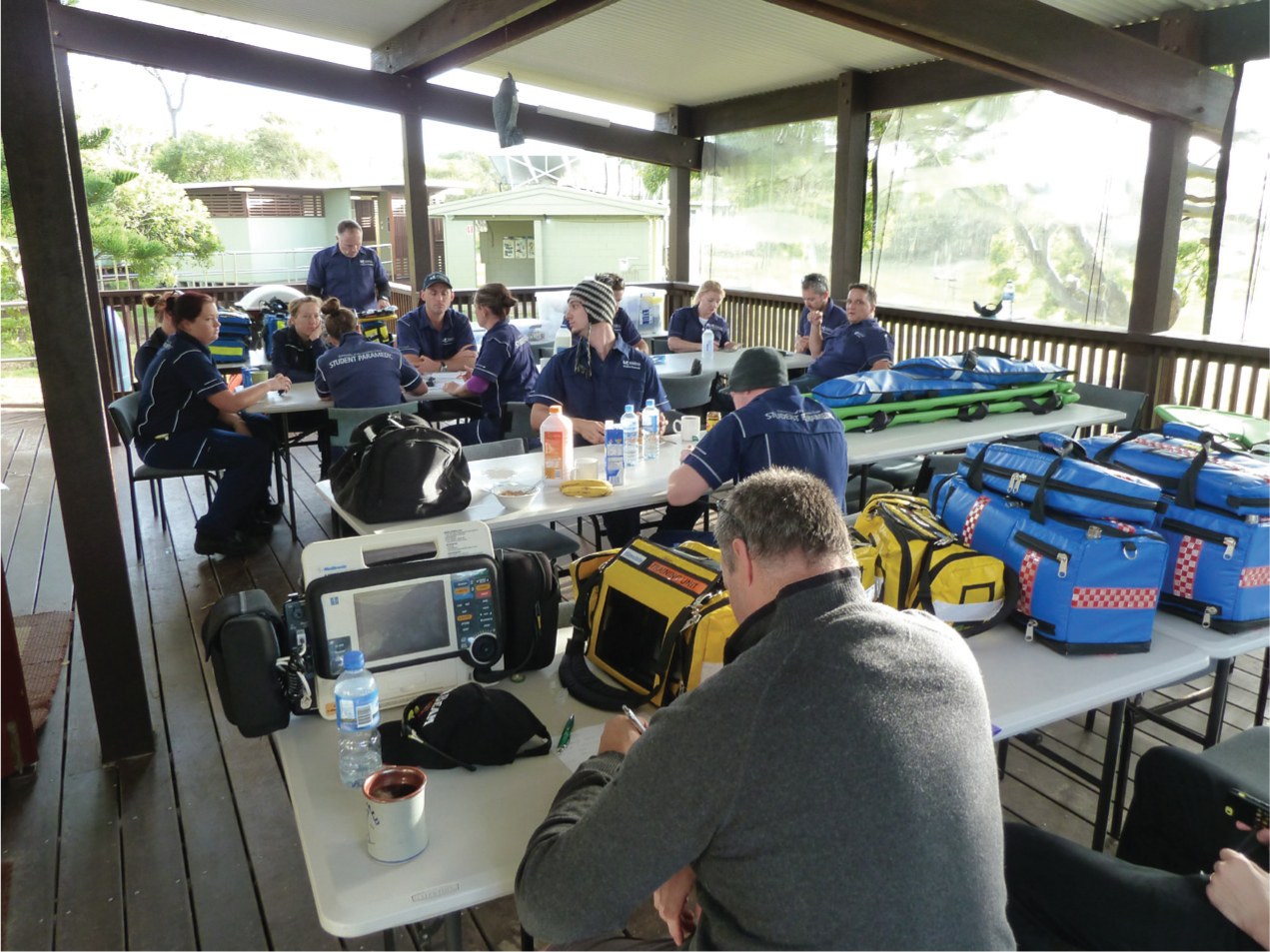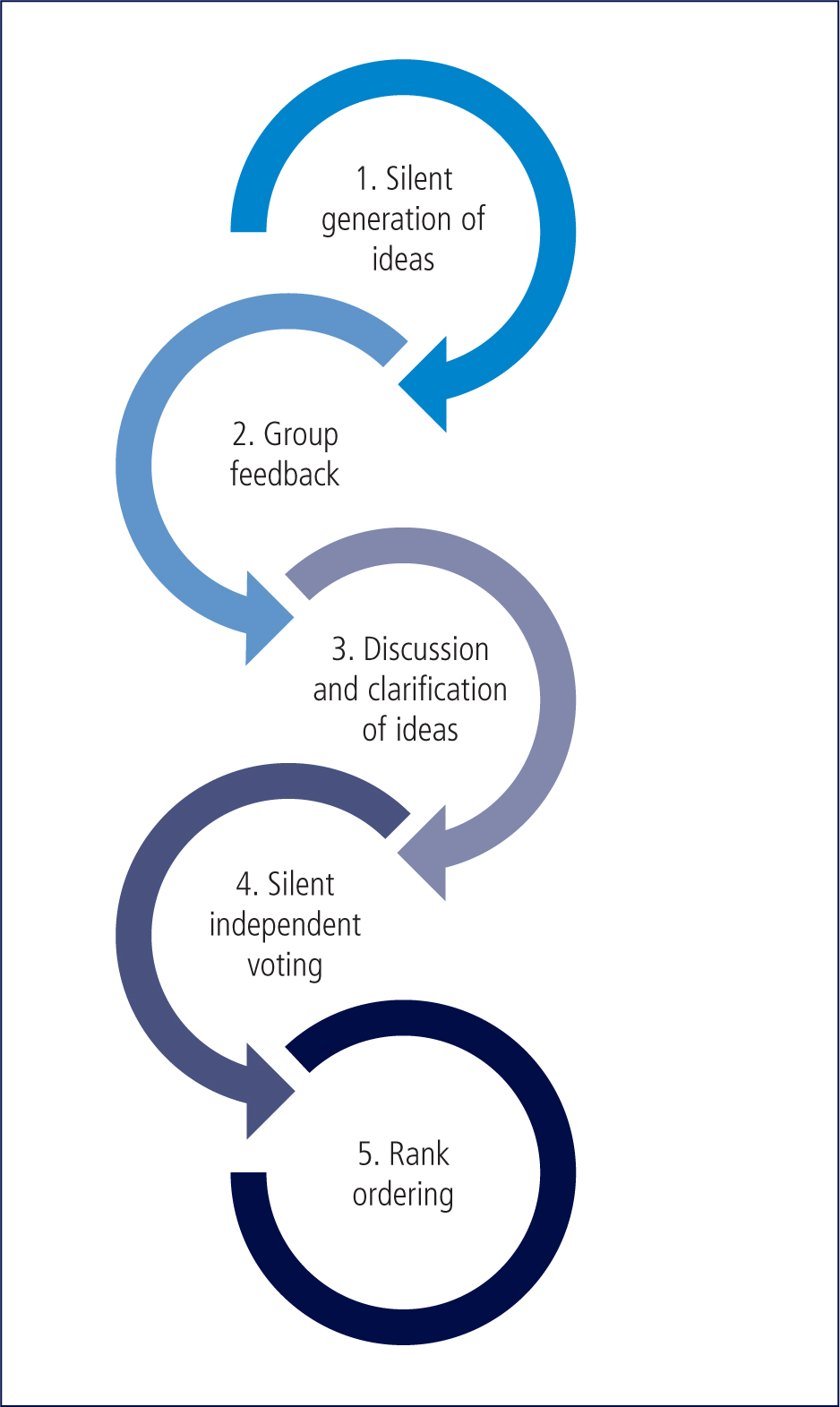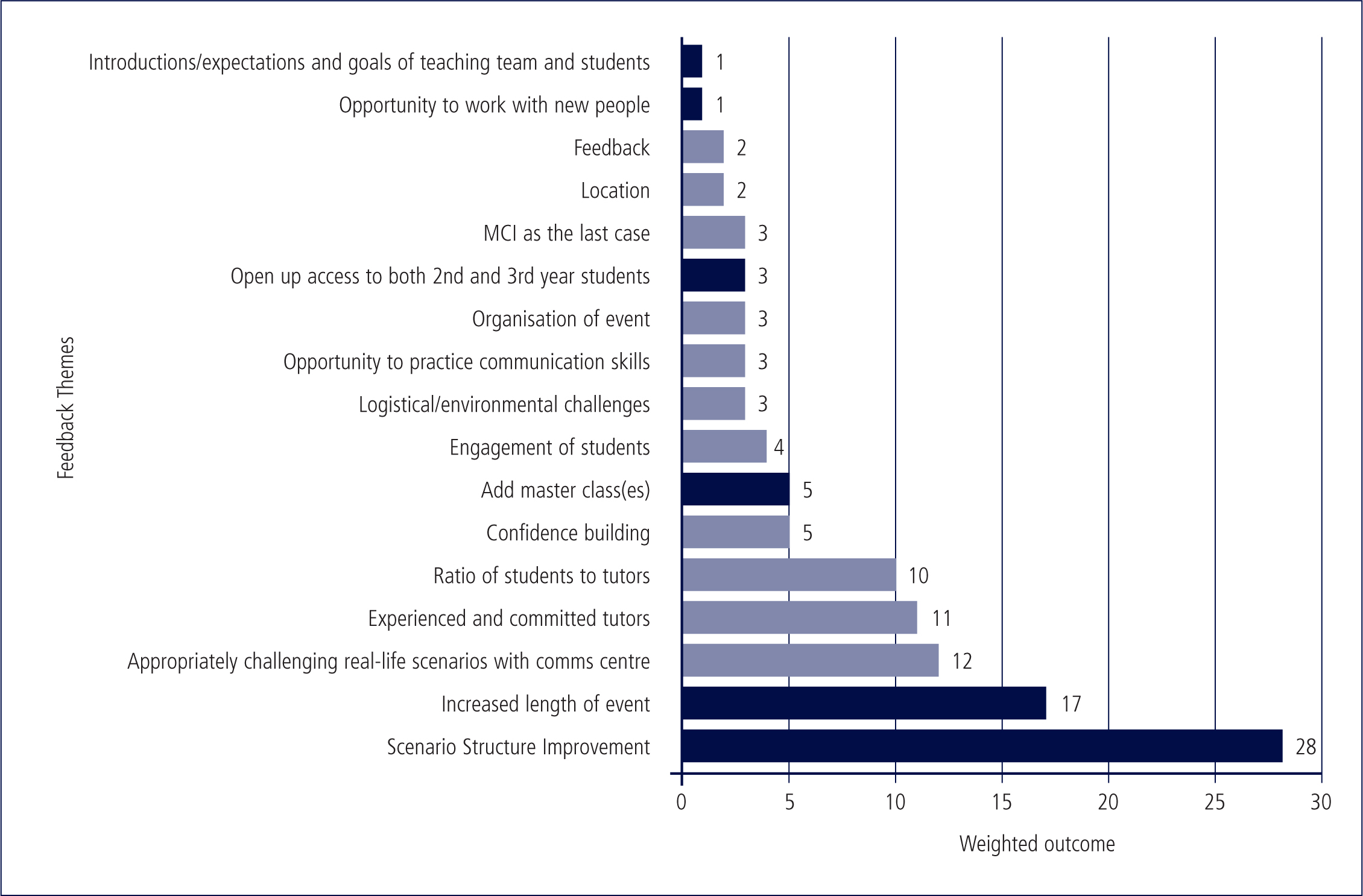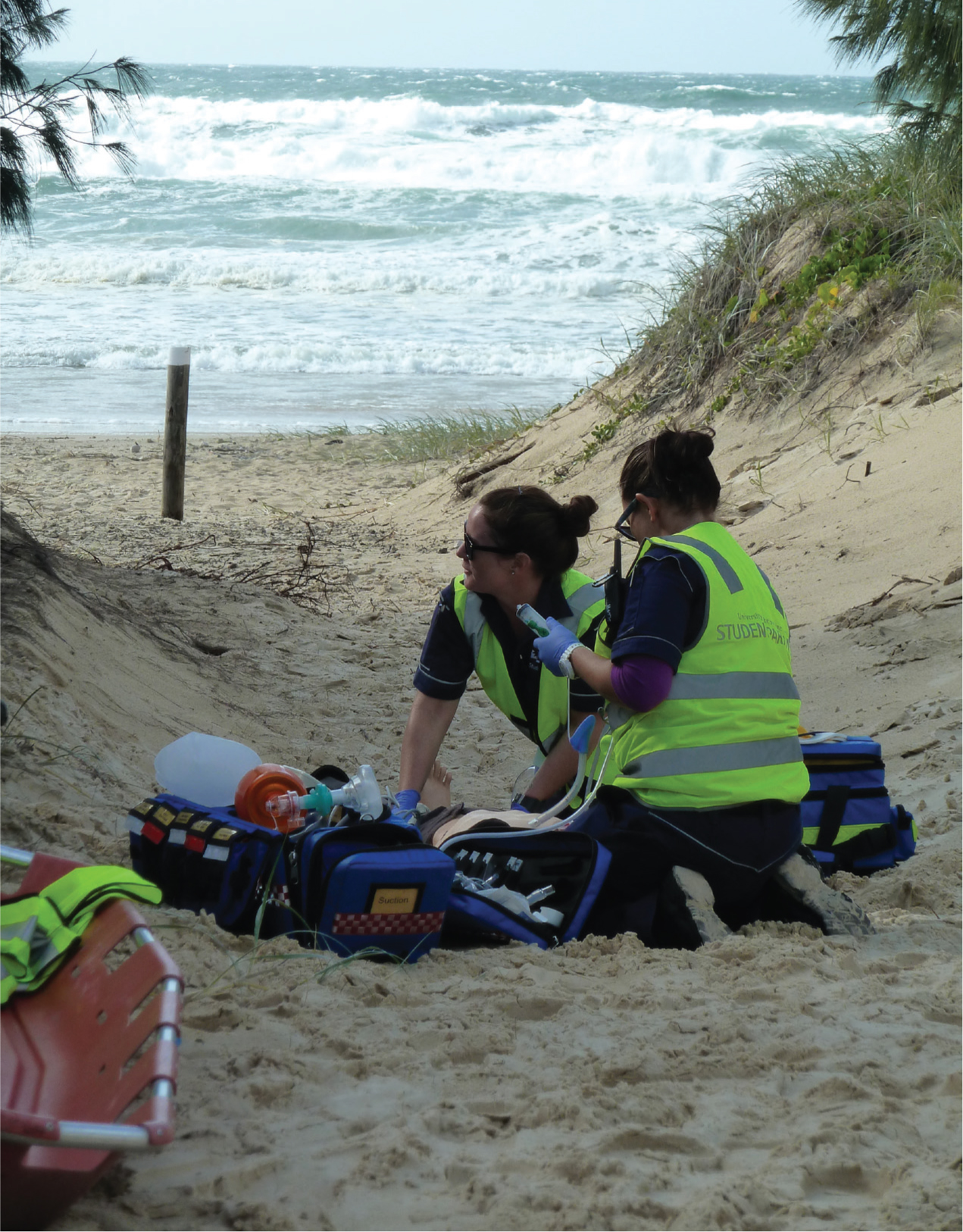The University of the Sunshine Coast (USC) is one of several Australian universities offering paramedic education that enables entry-to-practice. The educational philosophy underpinning the USC paramedic programme is one of social constructivism, where learners shape their own knowledge and skills through their actions and interactions within the social and cultural milieu of the discipline of study (Vygotsky, 1978). Experiential learning theories emphasise the importance of active engagement in learning, and the constructivist framework is a useful way to organise teaching strategies and design learning activities that develop clinical assessment and decision-making skills (Kolb, 1984). This requires a learning environment that provides students the opportunity to engage in new experiences (concrete experiences); develop reflective skills through multiple views of observation (reflective observation); conceptualise their observations and experiences by integrating them into theories (abstract conceptualisation); and to use these concepts for making decisions and solving problems (active experimentation) (Kolb, 1984).
When designing the curricular activities taught through the lens described, it is essential to consider the theoretical concepts and skills that are central to the mastery of a subject or specialisation. These are the threshold concepts (Meyer, 2008) in which the learner faces initial difficulties from either a conceptual, emotional or psychomotor basis, but once mastered, are portals to deeper understandings. However, context can play an important role in developing desired capabilities, and this realisation has informed the design of learning in the workplace or clinical practice setting.
Paramedics need to be able to operate in varying environments that may pose unique logistical and operational challenges that are rarely encountered in more controlled healthcare systems. In order to extend the use of experiential learning in challenging environments a series of simulated cases and skills stations were designed and implemented as part of a pilot of a remote area paramedic practice simulation event. The pilot simulation retreat was held at the University of the Sunshine Coast education centre at Fraser Island, Australia. The simulation event was designed for final year students completing a unit of study that focuses on injury in the community. The purpose of this paper is to present student data that emerged from the evaluation of this event in order to inform curriculum design, in particular the design of in-field simulation.
Methods
Workshop event and site
The remote area practice workshop was held on Fraser Island located approximately 200 km north of Brisbane, Queensland Australia. Fraser Island is separated from the mainland by the Great Sandy Strait. It is the largest sand island in the world and is approximately 120 km in length and 22 km at its widest point. It has an area of 184 000 hectares that is serviced by one paramedic in a four wheel drive ambulance based on the island and a helicopter emergency medical service based at Bundaberg 120 km away. As a popular tourist destination, the island attracts approximately 360 000 visitors each year (Department of Environment and Resource Management, 2008). Access to the island is by vehicle ferry and transport on the island requires four wheel drive on mainly sand tracks or on the beach (Figure 1), which is only navigable at low tide. The island is a world heritage area containing a diverse range of flora and fauna which includes species known to cause harm to humans. These include poisonous plants as well as goannas, dingoes, spiders such as the Funnel Web, and snakes such as the Eastern Brown and Death Adder. The surrounding ocean contains jelly fish, stingrays, sharks and saltwater crocodiles in the warmer season. Due to difficulties in travel and prolonged response to requests for assistance, this beautiful island is considered a dangerous and remote location.

The study site was at the USC Fraser Island Research and Learning Centre, an education and accommodation venue on the island. This venue has beach access and four wheel drive vehicle access to other areas of the island. The 2-day workshop was attended by eight staff (three USC academics, and five operational paramedics) and 18 students. A travel day each side of the workshop was required due to the remoteness of the area and the tides which affect travel on the island.
At the site a base station (Figure 2) with a mock control room was used to dispatch and coordinate simulations in real time. Students were responded to simulated cases involving patients with an injury sustained in the vicinity of the venue. Students worked in teams of two to assess the patient and provide care, and could request assistance from other student teams. A total of five trauma simulations and one skill station were conducted. The ‘patients' were either simulation manikins or students acting as patients. Each simulation involved approximately 20 minutes of participation and 20 minutes of debriefing. During the simulation the students were asked to make judgements of their own and their peers’ performances using criteria across five domains: planning, communicating, health status assessment, applying interventions and leadership. The teaching strategy specifically used self-assessment, peer-assessment and reflective practice to improve the acquisition of clinical reasoning and application of clinical skills.

The pedagogy and debrief for each simulation was based on the concept of assessment as learning (Earl, 2003) by granting all participants an active role in the simulation process. Students worked in groups of three or four; two participants acted as the primary attending clinicians while the other group member/s were privileged as peer assessors. Debriefing concentrated on peer- and self-assessment, reflection and metacognition. To debrief, the tutor facilitated the participants to make judgements of their work against pre-determined standards followed by deconstruction of those standards and how they will guide future practice. The ability to reflect in and on action was vital for improving practice and metacognition was used to strengthen students' awareness of their own thought processes.
Study population and data collection
Students undertaking a trauma management unit of study, in the third year of the Bachelor of Paramedic Science programme, self-selected to attend this extracurricular activity (n=18).
Data collection took place at the conclusion of the event during a debriefing session designed to evaluate the educational benefits and limitations of the exercise, including an evaluation of the value of holding a simulated event in a remote environment.
Analysis
A modified nominal group technique (NGT) consensus method was used during the debriefing session to identify problems, generate solutions and make decisions regarding the design and staging of future simulation events. NGT is a structured process which provides quantitative measurements through a qualitative approach, and includes two distinct stages of collaborative ‘brainstorming’ as well as anonymous ‘judgement’ (Delbecq et al, 1975; Jones and Hunter, 1995). The facilitator took the necessary steps to ensure their personal and professional views did not influence the discussion.
In this research the following ‘brainstorming’ steps were initially facilitated by a researcher (Figure 3):

The following ‘judgement’ steps were then facilitated:
Ethics approval was granted by the USC Human Research Ethics Committee (E/15/033).
Results
The results (Figure 4) indicate that the dominant positive themes of this workshop were the use of challenging and realistic scenarios, the commitment and experience of the tutors, student: tutor ratio, and the effect of the event on building confidence in the management of trauma. A smaller effect was observed for the organisation of the event, opportunities to practice radio communication techniques and the opportunity to work in a challenging environment.

The results also indicate a high level of consensus for a need for improvements to the structure of the scenarios. The sub-themes within this category addressed a desire for increased opportunities to lead a scenario, use of scenarios across life span, realistic resource allocation and access to simulation resources, increased length of time for each scenario, opportunities to act in a remote area single responder case, and scenarios during the night. The students also indicated high level of agreement on a need to extend the length of the event. This may reflect the need to terminate the second day prematurely due to adverse weather. While the students were able to operate in austere weather, the simulation manikins and some other simulation equipment were not designed to operate in wet conditions. Other themes that were flagged as opportunities for improvement included the addition of in-depth master classes delivered by disciplinary experts and the desire to open this event to students in earlier year levels.
Discussion
NGT was originally developed as a group method to formally create a consensus of opinions (Harvey and Holmes, 2012), and was therefore selected as a valid research method to evaluate students' experiences of the simulation event on Fraser Island. The strengths of the method include the collaborative nature of the ‘brainstorming’ stage, which discourages the domination of discussions by one or two participants, as well as the anonymous nature of the ‘judgement’ stage, which reduces the social pressure placed on individuals to comply with the group norms (Delbecq et al, 1975). The ability to adapt NGT (Jones and Hunter, 1995) was another reason for its selection as a research method. However, it is important to note that the results of the NGT simply outlines a consensus of participant opinion or areas of agreement and disagreement rather than a ‘correct’ answer, and cannot replace other methods of scientific enquiry.
Since its inception in the fields of economics and business, NGT has been used in other settings including higher education and health care. A search of the healthcare literature provides evidence of NGT as an effective method for the development of consensus on clinical competencies (Gibson and Soanes, 2000), as well as clinical standards (Hanekom et al, 2015). The technique has also been described as being useful in informing the design of teaching models (Burrows et al, 2011), initiating curriculum development (O'Neil and Jackson, 1983; Lloyd-Jones et al, 1999), identifying graduate attributes (Bromley, 2014), and evaluating teaching and assessment of inter-personal skills (Perry and Linsley, 2006).
Within the field of paramedic practice the literature search identified one record of the use of NGT as a programme evaluation tool for the vocational training of emergency medical technicians in the Unites States of America (Margolis et al, 2009). This research is the first time NGT has been reported on as a consensus method in higher education paramedic programmes outside the US.
The use of the NGT method for the evaluation of this simulation event allowed a structured process of critical feedback from all participants regarding the strengths and limitations of the event. Areas of strong consensus were identified, and this data will be used to inform the design, development and evaluation of future events. The data derived from the NGT indicated that the participants valued scenarios that represented real-world encounters, particularly when tasked to cases occurring in harsh environments. These small group exercises were designed to remove students from the well-controlled campus conditions and expose them to logistical challenges associated with the provision of paramedic services in remote areas. The exercise was designed to build confidence as well as competence in the assessment and management of trauma, which was acknowledged by the NGT results. Furthermore, the exercise provided opportunities to develop soft skills such as communication skills.


Opportunities to improve the event were also expressed. Although the remote location was selected to provide additional challenges relating to patient access and management, themes relating to the location and environmental challenges results in low levels of positive consensus. This may reflect missed opportunities to better use the environment to create realistic cases in remote areas.
Two themes dominated the feedback regarding future improvements: increasing the length of the event and developing the scenario structure. Several important sub-themes were identified and these require attention to improve the quality and perceived value of future events. Care must be taken when interpreting these weighted themes. For instance, there appears to be a consensus around the theme scenario structure improvement, which is actually made up of many low weighted items which were collapsed during secondary analysis (utilise location [6]; increased opportunity to lead a scenario [6]; Increase scope of scenarios across life span [4]; realistic resource allocation [3]; Increased access to simulation resources [3]; increased length of time for each scenario [2]; remote single officer cases [2]; night time [2]). Here the NGT method has provided a quantitative measure of the importance of scenario structure improvement to the participants, as well as identified qualitative sub-themes embedded in the larger construct. An understanding of this assists the academic team to make evidence based improvements in curricula based on participant consensus.
Conclusions
In response to this feedback the design of future in-field simulation events will be modified to address the major consensus items. Student involvement in the design and implementation of future events will also be sought through existing student liaison processes. Future events will be evaluated using a cycle of continuous quality improvement. The NGT process revealed a consensus on several themes that may not have been identified through individual student responses to surveys or other data collection methods. The strength of the NGT in this setting was the immediacy of feedback and the collaborative, anonymous process of reaching consensus. Educators are encouraged to consider the use of NGT as a means of capturing data to inform quality improvement processes in paramedic education.
Conflict of interest: none declared
